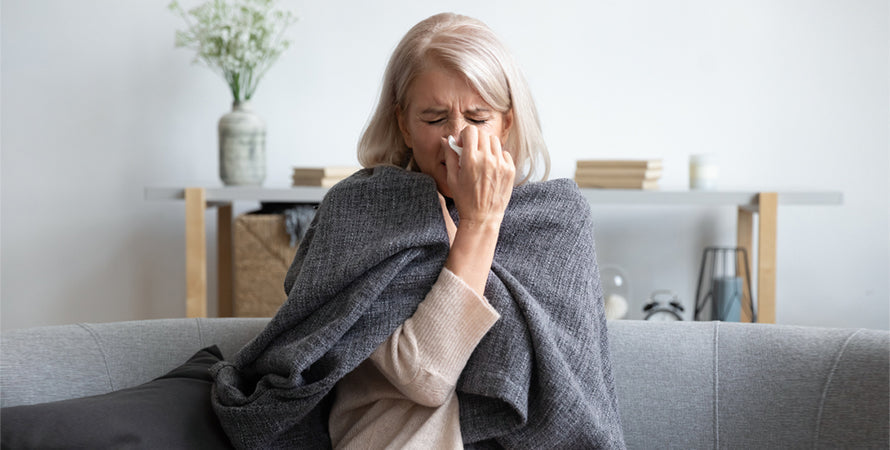Menopause fatigue is a real thing and this refers to the overwhelming and ongoing tiredness that is experienced by women during the menopausal transition. It is one of the biggest symptoms amongst women during this phase of life. This fatigue that menopausal women experience has huge impacts on different areas of their lives. This often leads to mood disturbances including irritability, anxiety and even depression (no, you aren’t going crazy, you are just going through menopause). Daily tasks and responsibilities become more challenging during this time, this often puts a strain on relationships and work-life balance reducing overall quality of life.
What Does Menopause Fatigue Feel Like?
Menopause fatigue can be experienced differently from person to person, it is usually characterised by physical sensations, mental and emotional components and cognitive aspects. Physically, it often manifests as a sense of heaviness in the limbs, an overall feeling of weakness as well as chronic tiredness.
Women experiencing menopausal fatigue generally report their body feels less responsive and energetic, we hear women say “I just don’t feel the same”.
The mental and emotional parts of menopause fatigue are just as significant as the physical components. Many women feel mentally drained, like their mind is depleted. Emotional exhausted during this time tends to be shown as heightened irritability, mood swings and a sense of vulnerability to stressors. Another huge symptom linked to menopause fatigue is difficulty concentrating, experiencing brain fog and memory lapses, these cognitive challenges can further exacerbate the overall mental and emotional burden of menopause fatigue.
What Causes Fatigue?
Menopause fatigue can be triggered and exacerbated by various factors, the hormonal fluctuations and imbalances during menopause play a central role here. Declining oestrogen levels during menopause are significant as this can disrupt the body’s hormonal balance. Hormonal imbalances directly affect mood, stress levels and emotional exhaustion all leading to further exacerbate menopause fatigue.
Sleep Disruptions: Oestrogen affects sleep regulation, declining oestrogen has been shown to lead to sleep disturbances, this can be seen by increasing hot flushes, night sweats and insomnia. This sleep disturbance can create a cycle of poor sleep quality, leading to chronic fatigue. Add this with hormonal imbalances on top and you have created a nightmare!
Lifestyle: Poor nutrition, lack of exercise and excessive stress significantly contribute to menopause fatigue. A diet lacking in essential nutrients can leave the body without the energy it needs to function optimally. Without physical activity and exercise in your life leads to low energy levels and poorer sleep quality and quantity. Exercise boosts your feel-good hormones that are usually low in menopause. High stress levels exacerbate hormonal imbalances and disrupt sleep and mood regulation also.
How to Relieve Menopause Fatigue
Here are some ways to modify your diet to provide you with more energy and combat fatigue.
Balanced Diet and Nutrition
Consume balanced meals that include a combination of carbohydrates, proteins and healthy fats. This will give you a steady release of energy throughout the day.
- Complex carbohydrates include whole grains, legumes and starchy vegetables. These help to provide you with sustained energy and prevent blood sugar spikes and crashes.
- Protein rich foods include lean protein such as poultry, fish, eggs, red meat, beans and tofu. These foods will help you feel fuller for longer and support nervous system and muscle health.
- Healthy fats include avocadoes, nuts, seeds, olive oil and butter. They provide long lasting energy and support hormonal balance.
- Include at least 2L of water every day, dehydration can contribute to fatigue. Sip on infused waters and herbal teas also.
- Reduce your caffeine intake. Although caffeine can give you a quick hit of energy, excessive intake can lead to energy crashes and sleep disturbances.
- Avoid excess sugar. Sugary beverages and food can cause rapid blood sugar spikes and crashes leading to fatigue.
Exercise and Physical Activity
Regular physical activity offers so many benefits for improving energy levels and enhancing overall health. Here are some of the key benefits:
- Exercise stimulates the release of endorphins – these are natural mood booters. This can lead to increased energy levels and reduced feelings of fatigue.
- Exercise is a natural stress reliever, it helps the body manage and reduce the production of stress hormones like cortisol. Lower stress levels can lead to improved mood and reduced mental fatigue.
- Better sleep! Practicing regular physical activity can improve sleep quality and duration as it helps to regulate the sleep-wake cycle meaning you could wake feeling more refreshed.
Stress Management Techniques
Lowering stress levels are really important to reduce menopause fatigue, here are some techniques you can practice to reduce your stress:
- Practice daily guided meditation: Guided meditations are audio or video recordings that lead you through a specific meditation or relaxation exercise. They can be a helpful way to nourish your nervous system.
- Gratitude Journaling: Keeping a gratitude journal involves writing down things you're grateful for each day. This practice can shift your focus to positive aspects of life and reduce stress.
- Find a hobby: Pursuing hobbies and interests outside of work can be a great way to recharge and redirect your energy. Whether it's gardening, cooking, or a sport, engaging in activities you enjoy can improve stress.
- Breathing Exercises: Various breathing exercises, like the 4-7-8 technique, can help calm your nervous system, reduce stress, and boost your energy levels.
- Laughter Therapy: Laughter is a natural stress reliever and mood booster. Watching a funny movie, attending a comedy show, or simply laughing with friends can enhance your well-being and energy.
Quality Sleep
Creating a sleep friendly environment and practicing good sleep hygiene is essential for achieving a restful and rejuvenating sleep. Here’s why:
- Sleep regulates the circadian rhythm. Having a good sleep environment consistent bedtime routine will help your body’s internal clock to promote better sleep quality and overall energy levels.
- Good sleep hygiene practices like avoiding caffeine and screens close to bedtime can reduce common sleep disruptions leading to a more enjoyed, uninterrupted and restful night’s rest.
- Practicing good sleep hygiene can lead to better mood balance and lowered mental health concerns.
- A bedtime routine that incorporates relaxation techniques like deep breathing and meditation can help reduce stress and promote a calmer, deeper sleep.
Alternative Therapies
There are many alternative therapies that can help women manage fatigue during menopause, these include:
- Acupuncture. Acupuncture is a Chinese practice that involves inserting thin needles into specific points or meridians/channels in the body to promote balance and energy flow.
- Aromatherapy. Essential oils such as rosemary, peppermint and citrus oils can provide a natural energy boost when used in a diffuser or applied topically (diluted with a carrier oil).
- Hypnotherapy. This therapy can be used to address underlying psychological factors contributing to fatigue such as anxiety, depression and sleep disorders.
Natural supplements can help to boost the bodies vitality and energy, ensuring nutrient stores are adequate is also important. Here are some supplements that can help with menopausal fatigue:
- Happy Hormones. This supplement contains many herbs and nutrients that hold hormone modulating properties meaning that this helps to regulate your hormonal imbalance. HH can also help with mood regulation, energy levels and stress reduction combating fatigue and supporting energy production.
- MSP. MSP helps to improve sleep quality and quantity as it holds 4 different types of magnesium along with useful calming, adaptogenic herbs and other nutrients. MSP nourishes the nervous system helping to regulate the body’s stress response. Magnesium also helps to synthesis ATP which is the primary source of energy for cellular functions.
- Happy Liver. Happy Liver can help to improve energy levels as it helps to improve digestion, detoxification pathways, hormone regulation and nutrient absorption.
When to Seek Medical Advice
If you are struggling menopausal fatigue, please feel free to book into our online clinic for a free 10 minute chat to discuss how we can support you. If you have tried everything and nothing seems to work then we encourage you to book into see one of our Naturopaths for a 1:1 full consultation where we can look into further testing and practitioner grade products. If your menopause fatigue is affecting your mental health greatly then we recommend seeking guidance from your general practitioner.
Hormone Replacement Therapy (HRT) replaces hormones with synthetic hormones. This medication has worked for some ladies however we do encourage you to try Happy Hormones for a 3 month period before choosing HRT as there are many negative side effects that come with this drug such as increased risk of blood clots and breast cancer.
Closing Thoughts
Whilst you are on your menopausal journey, remember that fatigue is a very common symptom through this transition. There are many ways that you can support your body’s energy levels including dietary and lifestyle modifications, stress reduction techniques, sleep quality tips and supplements that can support you through this phase of life. The key is to implement a combination of methods to support your body. Embrace the knowledge and tools available to you and step into this new phase of life with confidence that you have got this!








Leave a comment
This site is protected by hCaptcha and the hCaptcha Privacy Policy and Terms of Service apply.